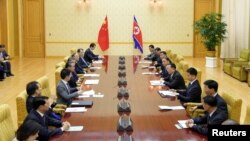China may be a “new road” for North Korea if diplomacy with the United States fails, experts say.
Chinese Foreign Minister Wang Yi met with a senior North Korean official Wednesday in Pyongyang during a three-day visit that began Monday, according to the Chinese Foreign Ministry.
Wang told Ri Su Yong, vice chairman of North Korea’s ruling Workers’ Party, that China’s prosperity cannot be impeded by any country, apparently referring to the U.S., with which Beijing has been involved in an ongoing trade dispute.
Wang said Beijing and Pyongyang should bolster cooperation and protect their mutual interests as Ri expressed hope for close ties, according to the ministry.
The Chinese diplomat also met Tuesday with North Korean Foreign Minister Ri Yong Ho, and Ri said North Korea is willing to work with China to develop relations in the “new era.”
Wang’s trip to Pyongyang is widely believed to be in part preparation for North Korean leader Kim Jong Un’s potential meeting with Chinese President Xi Jinping in Beijing.
Reconciliation
Kim and Xi held their first summit in March 2018, ahead of U.S. President Donald Trump’s landmark Singapore summit in June 2018, and have stepped up diplomacy in an apparent move to repair their relationship. Kim and Xi have met five times since the first summit.
Relations between the two historical East Asian allies soured when Kim took power in 2011 and began testing nuclear weapons and long-range missiles. In response to North Korea’s weapons tests in 2016 and 2017, Xi supported U.S.-led sanctions against the country.
Wang’s visit to Pyongyang came as North Korea’s first Vice Foreign Minister Choe Son Hui said on Saturday that expectations for talks with the U.S. are fading. Talks between Pyongyang and Washington have stalled since the breakdown of the Hanoi summit in February, where Kim failed to secure sanctions relief from Trump.
Ken Gause, director of the adversary analytics program at CNA, told VOA in an email, “There is a good chance that what Kim Jong Un meant by his end-of-the-year promise to go in a different direction is that North Korea intends to move closer to China.”
Kim said during his 2019 New Year’s Day speech that he was willing to seek a “new path” if the U.S. continued to force sanctions on North Korea. In April, Pyongyang said it would give the U.S. until the end of the year to become more flexible, and later reiterated its threat to pursue a “new road” if the U.S. and South Korea conducted scheduled military drills, which the two allies carried out in August.
“Expect Kim to continue efforts to ease sanctions and build friendlier ties with China, Russia and other willing countries,” Robert Manning, a senior fellow at the Atlantic Council, said in an email to VOA about the China-North Korea meetings.
Manning thinks Wang’s visit is an attempt to “bolster ties with Pyongyang as a safeguard against provocative North Korean behavior and to position [itself] when current U.S. diplomatic efforts [with North Korea] grind to a halt.”
Common interests
According to Gary Samore, a senior fellow at the Harvard Belfer Center’s Korea Project, Beijing and Pyongyang share interests in boosting their ties, including removing U.S. troops from South Korea and disrupting Washington’s alliance with Seoul and Tokyo.
“On this issue of the U.S. alliance in the [East Asia] region, both North Korea and China have the same interest,” Samore said. “They want to remove a U.S. military presence in East Asia, not just in South Korea but in Japan as well … and eventually destroy the U.S. alliance system with South Korea and Japan. Unfortunately, President Trump is doing a lot of damage without China having to do anything. Trump is basically acting in a way that China finds very positive.”
In August, Trump said South Korea “agreed to pay substantially more money to the U.S. in order to defend itself from North Korea.” He often said South Korea should pay more to keep about 28,500 U.S. troops in South Korea, an idea that South Korea rejects.
Differences over cost-sharing for keeping the U.S. military in South Korea have apparently been exacerbated by Seoul’s decision in August to end an intelligence-sharing pact through which it agreed to share sensitive military information with Tokyo.
Seoul’s decision generated U.S. criticism because the withdrawal could complicate U.S. security cooperation with both South Korea and Japan to guard against a North Korean threat.




